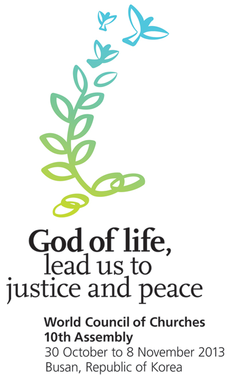Justice and peace in focus during WCC general secretary’s visit to US

Stan Noffsinger (left), general secretary of the Church of the Brethren, presents Olav Fykse Tveit and Natasha Klukach books on the church's history and liturgy. © The Church of the Brethren
22 August 2013
The ecumenical calling of churches and exploring different ways of renewing their commitment towards justice and peace was a significant focus during the World Council of Churches (WCC) general secretary Rev. Dr Olav Fykse Tveit‘s recent visit to churches in the United States.
Tveit’s 7 to 16 August visit included discussions with the Church of the Brethren, and attending the Annual Session of the Progressive National Baptist Convention (PNBC) and Church-wide Assembly of the Evangelical Lutheran Church in America (ELCA).
Speaking to a congregation at the Neighbourhood Church of the Brethren in Montgomery, Illinois, Tveit said, “The call to strive for the values of the kingdom of God is actually to strive for what brings justice and peace.” He added that keeping the values of the kingdom of God in our hearts is “a call to share, to release our attention from what we have to what others need.”
These insights were focused on the theme of the WCC’s upcoming assembly, “God of life, lead us to justice and peace”. The 10th Assembly of the WCC will be held in Busan, Republic of Korea, from 30 October to 8 November.
During his visit to the Church of the Brethren, Tveit met with senior staff of the church at its national office in Elgin. In the meeting, there were discussions of congregational life, ethical investment and theological issues related to historic peace churches.
While in the United States, the WCC general secretary attended the PNBC’s 52nd Annual Session, addressing the theme “Securing our future: seeking – a people of service”.
In his message Tveit reflected on the place of fellowship among churches in understanding the concept of service. “The servants of God only can serve when we are willing to be served by Jesus Christ himself and consequently by the fellowship to which we belong, called the body of Christ,” he said.
Tveit added that the “WCC is a fellowship where we serve and are served by the gifts of the others”.
He said that churches’ prophetic call to justice was needed in the past and is needed it now.
Renewal of ecumenical commitment
The Annual Session examined the potential of renewal arising from a strong legacy of churches’ advocacy for social and racial justice. Resolutions passed at the assembly included ones related to health, the environment, voting rights, education and global humanitarian need as well as one commemorating the 50th anniversary of the 1963 March on Washington and Martin Luther King’s historic “I Have a Dream” speech.
While attending the Church-wide Assembly of the ELCA, Tveit offered his reflections on the event’s theme “Always being made new: 25 years together in Christ”.
“The renewal of the church and the unity of the church are never primarily for the church itself, for ourselves, but for the mission of the church, for those who need the church the most, for those who might sit in different kinds of darkness or in the shadow of death,” he noted.
“When we are renewed in our ministry to serve the other, we are renewed ourselves,” he added.
The ELCA assembly elected Elizabeth Eaton of Northeastern Ohio Synod as its new presiding bishop. The WCC general secretary congratulated her, offering encouragement for her ministry. He also praised contributions of the current presiding bishop, Mark Hanson.
Natasha Klukach, WCC programme executive for Church and Ecumenical Relations, said, “Churches have been involved in conciliar ecumenism for a long period of time, and this visit offered evidence of a desire for renewal of ecumenical relationships and engagement.”
“We were grateful not only for the warm welcome by our member churches but also for the insight into those churches’ important contributions to the social and political landscapes in the United States,” said Klukach, who accompanied the WCC general secretary on his visit.
WCC general secretary’s sermon at the Church of the Brethren
WCC general secretary’s address at the Progressive National Baptist Convention event
WCC general secretary’s address at the Evangelical Lutheran Church in America assembly
WCC member churches in the United States of America




